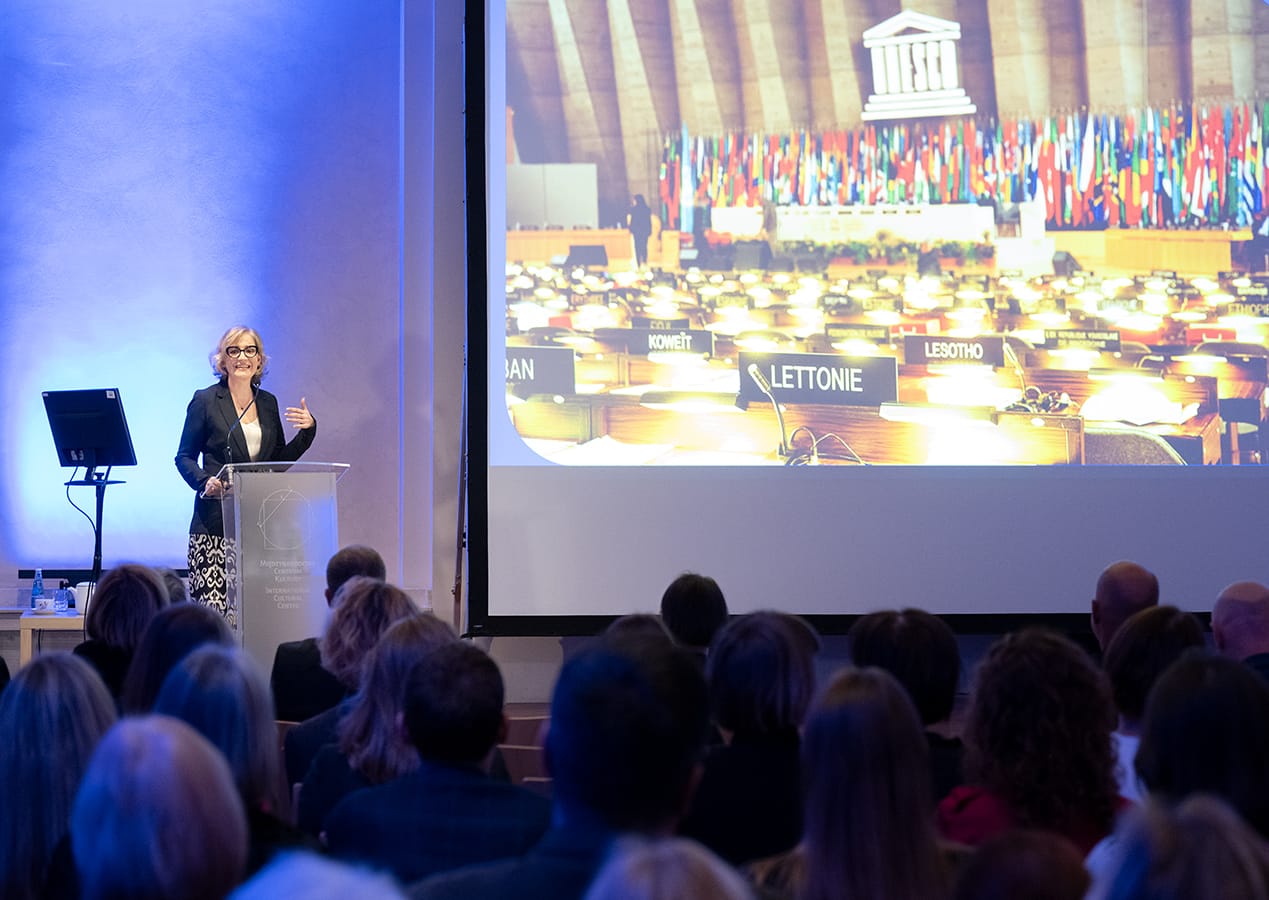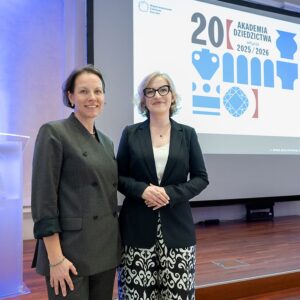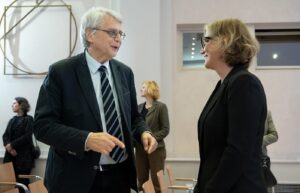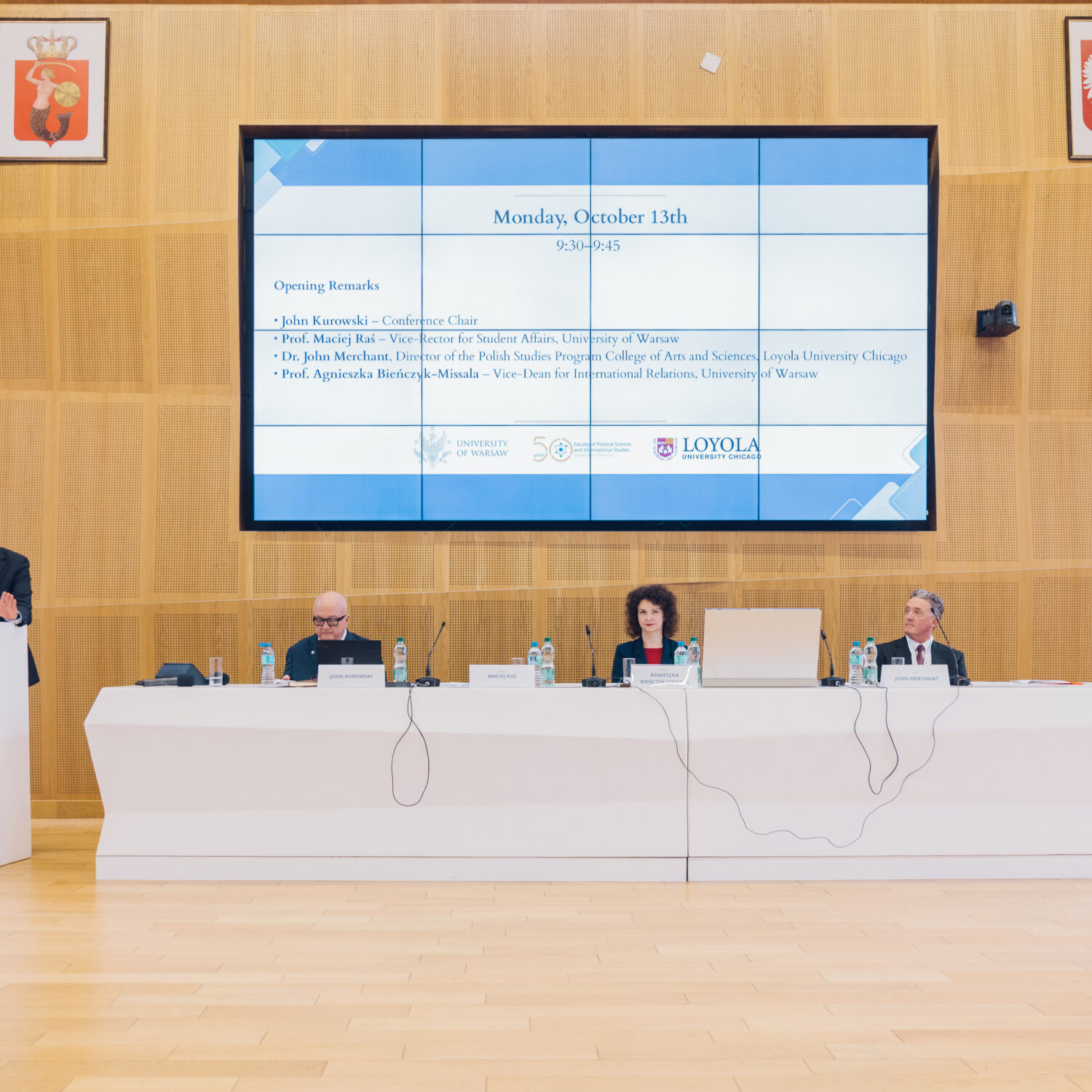Wykład inauguracyjny dr hab. Hanny Schreiber podczas 20. edycji Akademii Dziedzictwa MCK w Krakowie

Komunikat o terminie i formie ubiegania się o pomoc materialną w roku akademickim 2025/2026 (dla osób studiujących)
16 października, 2025
Wizyta studyjna studentów w Kancelarii Prezesa Rady Ministrów
17 października, 2025
English below
10 października 2025 roku dr hab. Hanna Schreiber (Katedra UNESCO UW) wygłosiła wykład inauguracyjny otwierający jubileuszową, 20. edycję Akademii Dziedzictwa w Międzynarodowym Centrum Kultury w Krakowie.
Wystąpienie zatytułowane „Kto dziedziczy dziedzictwo? Niewidzialni dziedzice, algorytmy i bezpieczeństwo w świecie dziedzictwa niematerialnego” zgromadziło przedstawicieli świata nauki, instytucji kultury i absolwentów Akademii.
Punktem wyjścia była refleksja nad dynamiczną naturą dziedzictwa niematerialnego w świetle Konwencji UNESCO z 2003 r. Dr hab. Schreiber omówiła trzy wyzwania współczesnej polityki dziedzictwa:
- Niewidzialni dziedzice – wspólnoty i aktorzy (także nie-ludzcy), pomijani w oficjalnych narracjach;
- Algorytmizacja wiedzy o dziedzictwie – wpływ AI i technologii na narracje kulturowe;
- Sekurytyzacja dziedzictwa – dziedzictwo jako zasób strategiczny i element tożsamości.
 W perspektywie jubileuszu 20-lecia Akademii Dziedzictwa MCK celem wykładu była nie tylko diagnoza, ale i zaproszenie do ponownego przemyślenia tego, dla kogo, przez kogo i w jakim celu chronimy dziś nasze tradycje – w świecie globalnego niepokoju, w którym granice między kulturą, technologią i bezpieczeństwem są coraz bardziej płynne i problematyczne.
W perspektywie jubileuszu 20-lecia Akademii Dziedzictwa MCK celem wykładu była nie tylko diagnoza, ale i zaproszenie do ponownego przemyślenia tego, dla kogo, przez kogo i w jakim celu chronimy dziś nasze tradycje – w świecie globalnego niepokoju, w którym granice między kulturą, technologią i bezpieczeństwem są coraz bardziej płynne i problematyczne.


English version
Inaugural lecture by Dr. hab. Hanna Schreiber on the occasion of the 20th edition of the Academy of Heritage in Kraków
Dr. hab. Hanna Schreiber (UNESCO Chair on Intangible Cultural Heritage in Public and Global Governance, ichgovernance.com) had the pleasure of delivering the inaugural lecture on October 10, 2025, on the occasion of the 20th edition of the Academy of Heritage (Akademia Dziedzictwa) at the International Cultural Centre (Międzynarodowe Centrum Kultury, MCK) in Kraków. The lecture brought together many distinguished guests, including the founders and leadership of the Academy and MCK, rectors of Kraków universities, representatives of cultural institutions, alumni, and new students of the Academy of Heritage. The lecture was titled “Who Inherits Heritage? Invisible Heirs, Algorithms, and Security in the World of Intangible Cultural Heritage.”
The starting point was a reflection on the definition of intangible cultural heritage in the 2003 UNESCO Convention — as a dynamic phenomenon, rooted in inter-community relations and intergenerational transmission. It is precisely that dynamism that makes intangible heritage one of the greatest challenges for contemporary heritage protection systems, which are often too rigid and too centered on states and experts.
During the lecture, three contemporary phenomena in heritage policy were discussed:
- Invisible heirs — communities and actors (including non-human, more-than-human entities), who do not neatly fit within conventional frameworks of “heritage bearers,” yet are crucial for the survival of tradition.
- Algorithmisation of heritage knowledge — the role of artificial intelligence and “big tech” in shaping and filtering narratives about intangible heritage, and whether AI is already co-shaping culture.
- Securitisation of heritage — when traditions become strategic resources and identity markers that must be “defended,” especially in the context of global and hybrid threats to cultural identity and sovereignty.
 In view of the 20th anniversary of MCK’s Academy of Heritage, the aim of the lecture was not only diagnosis but also an invitation to rethink for whom, by whom, and for what purpose we protect intangible cultural heritage today — in a world of global uncertainty, where the boundaries between culture, technology, and security are becoming increasingly fluid and problematic.
In view of the 20th anniversary of MCK’s Academy of Heritage, the aim of the lecture was not only diagnosis but also an invitation to rethink for whom, by whom, and for what purpose we protect intangible cultural heritage today — in a world of global uncertainty, where the boundaries between culture, technology, and security are becoming increasingly fluid and problematic.





